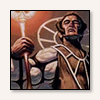Welcome back to our regular series Judge’s Corner, where we answer your Magic: the Gathering rules questions.
Q: I play [card]Kasmina’s Transmutation[/card] on my opponent’s creature that has five +1/+1 counters on it. How big is it now?
A: [card]Kasmina’s Transmutation[/card] changes a creature’s power and toughness to base one instead of base ten. With five +1/+1 counters, it is now a 111111/111111.
Q: How does Aeon Engine work in a two-player game?
A: It works the same as it does in a multiplayer game. For instance, if it’s currently the fourth turn of the game when Aeon Engine is activated, then [card]Serra Avenger[/card] is unable to be played on subsequent turns, as they will now be the third, second, first turns of the game, and so on.
Q: I’m a new player and noticed [card]Price of Betrayal[/card] says it can remove counters from my opponent. Why would my opponent have counters?
A: Magic is a game that prides itself on supporting all sorts of players, including spineless cowards who can’t bear to see your spells resolve.
Q: Can you explain how prize splitting works?
A: When there are two players remaining in an event and a winner is not able to be determined, a wise judge can offer to split the prize, with each player receiving half. The player who objects to this prize split is the one who clearly actually cares about the prize, and thus they will be declared the winner.
Q: So I saw that article about how Magic is Turing-complete, and I know that any Turing-complete system can simulate any other. Is it legal for me to use my “computer” to simulate a separate game of Magic with ante cards and use those to take my opponent’s cards for keeps?
A: Card-based computer simulations have not been acceptable in tournament play since Leaping Lizards was removed from development of Magic: The Gathering Online.
